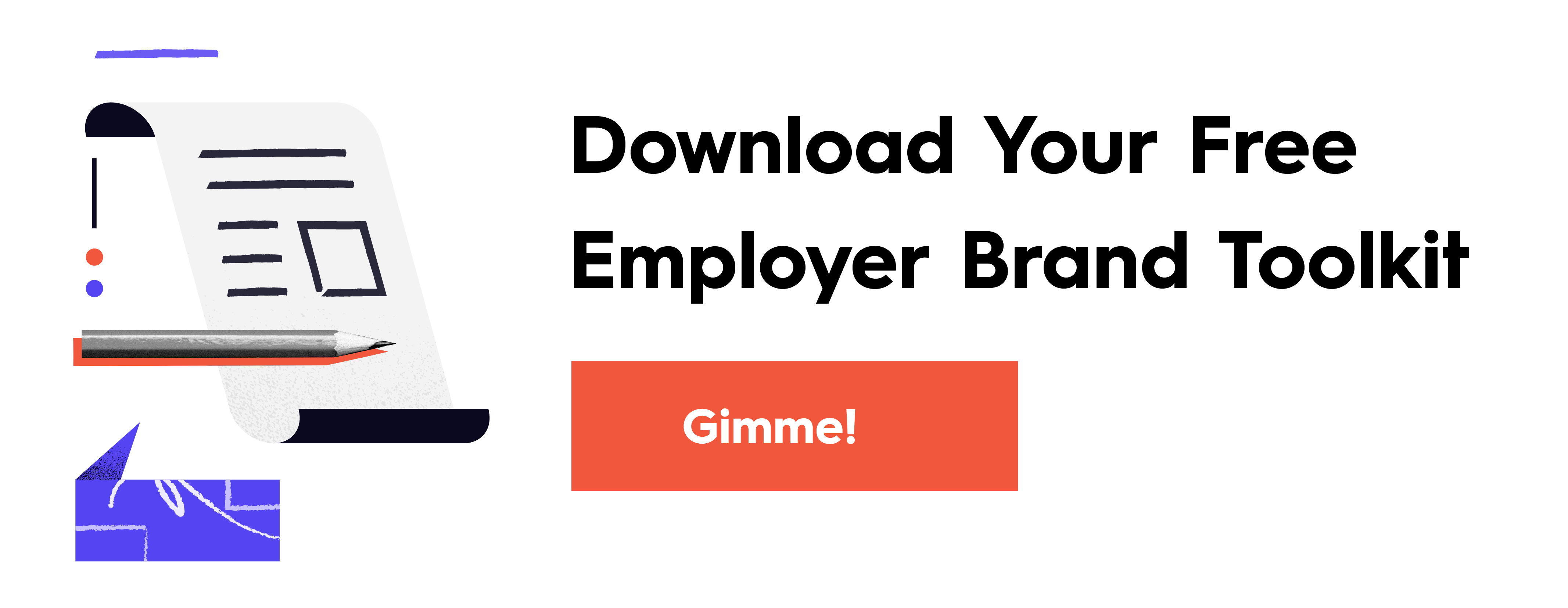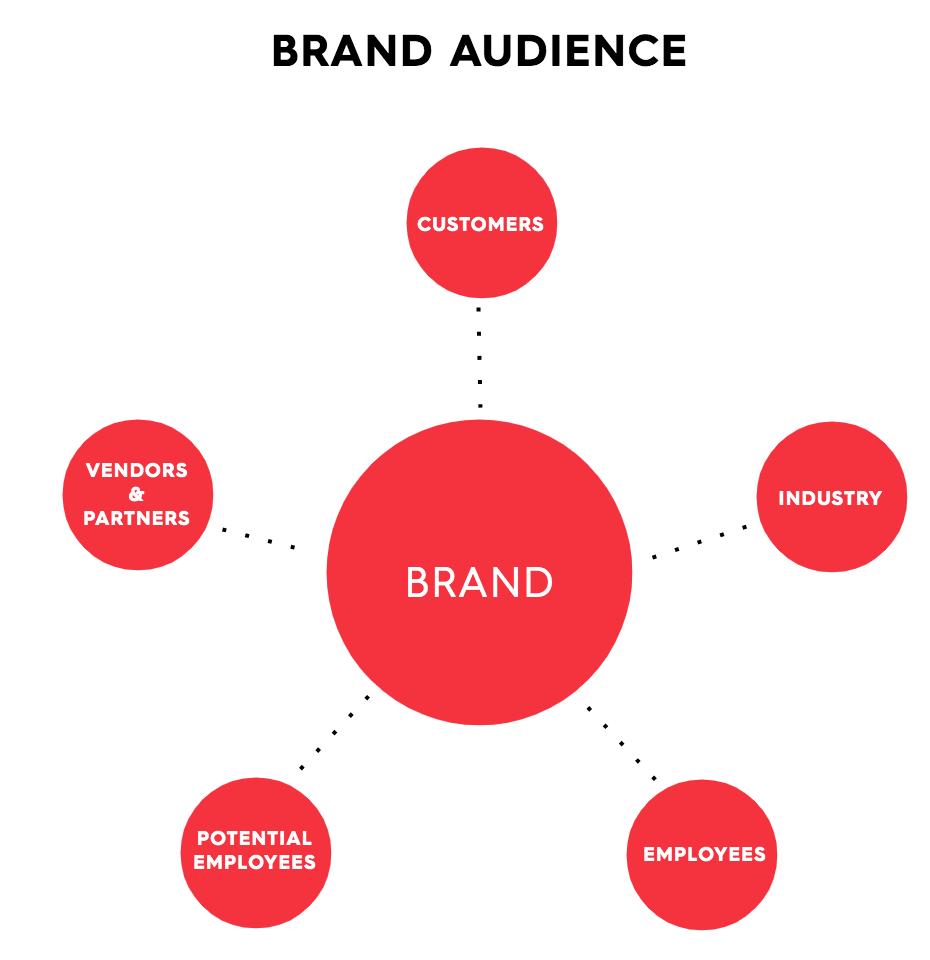Your brand’s long-term success doesn’t lie in your product innovation or service offerings; it’s in your employees. They’re the ones who lend their time, energy, bodies, and minds to your brand, and they will ultimately help you grow it or abandon it. Now that employees are leaving their jobs by the millions, attracting new employees and keeping the ones you have united around a shared vision is tougher than ever. That’s why investing in your employer brand is crucial. Not only does it help you align your business and people but it pays off (literally) in more ways than you may realize.

Why Should You Invest in Your Employer Brand?
Post-Pandemic, employment has radically changed. Employees have higher expectations than ever before (as perks like remote work have become more common), and employers have more hiring competition than ever. Brands that want to find and keep the best and brightest need to be aware of these key market changes—and strategize around them.
1) Jobs are easier to find—and leave. Social media has given job seekers more access to jobs than ever. Through sites like LinkedIn, Monster, or Twitter, people have larger networks and can interact more easily with potential employers.
Tech has also made it easier to work remotely, removing geographic barriers that used to keep people’s options limited. That means brands aren’t just competing with local businesses for talent; they may be competing on a national or even global scale.
2) Employees want more than money. According to Glassdoor, more than 77% of adults would consider a company’s culture before applying for a job there, and 56% say company culture is more important than salary when it comes to job satisfaction.
Today, people want to align themselves with brands they believe in and do meaningful work that’s worth their time and commitment. Beyond the standard benefits, things like culture, community, purpose, personal development, and growth are all deciding factors. If your brand hasn’t invested in these areas, you’ll find it much harder to entice people to work for you.
3) How you treat your employees matters—to everyone. Whereas a brand’s “audience” was once just its customers, social media has increased transparency all around. A brand is now communicating with a larger ecosystem, including employees, potential employees, customers, vendors, and industry. Bad behavior in any of those spheres will affect a brand’s reputation in all of them.
Now that sites like Glassdoor or Reddit empower employees to speak out, there is even more accountability. You may have a 5-star customer service rating, but if you notoriously mistreat your employees, people won’t want to support you.

Ultimately, these trends have forced us into a more sophisticated era of recruiting. If you want a strong brand, you need to invest in your people. Nurture your employees, create a place where people are proud to work, and they will help you create the brand you want. Luckily, focusing on employer branding is the most effective way to do this.
What Is the Real ROI of Your Employer Brand?
Truthfully, many brands haven’t realized the full power of employer branding yet, which is why now is the best time to invest in it. This undervalued and overlooked tool can have a tremendous pay-off in all aspects of your business, both internally and externally.
1) Recruiting.
Finding job candidates requires an investment of time, energy, and resources. Hiring the wrong person is even more expensive. According to the U.S. Department of Labor, a bad hire can cost up to 30% of the employee’s first-year salary.
Employer branding can make the hunt easier and much less costly. When you can tell your story effectively, show people why you’re different, showcase your culture, and give people an honest and authentic sense of who you are, you will entice the right kind of people to apply, saving you valuable time, money, and effort.
Tip: Follow these 25 tips to turn potential candidates into employees.
2) Retention.
It’s much more economical to keep your good employees than to go out and find new ones. According to the Work Institute’s 2020 Retention Report, turnover costs an estimated 30% of a worker’s annual salary to replace. (Worse, if they leave to lend their talents to a competitor, you may lose your market share too.)
A strong employer brand is a safeguard. The better your reputation, the less turnover you’ll have.
Tip: Beyond perks like an education fund or time off, your daily interactions and practices largely influence whether or not your employees want to stick around. Look for ways to enhance their working experience, whether it’s through creative activities or non-work-related facetime.
3) Engagement.
According to Gallup, low engagement costs the global economy $8.1 trillion. Even worse, Gallup finds that only 20% of employees are engaged at work. This is a huge problem—that can be solved by strengthening your employer brand.
Employer branding provides people with a sense of purpose, a supportive community, and a value system they can align themselves with. This makes people more engaged, more invested, and more productive, which directly translates to your bottom line. (According to BCG, employees who are happy at work are 1.5 times more likely to say they always want to give their best.)
The more you invest in creating a strong, healthy culture, the happier your employees will be.
Tip: Many factors at work can affect employee engagement, from inclusion practices to work-life balance. Find out how to build a strong culture that helps your employees feel connected to the workplace.
4) Referrals.
A strong employer brand also helps you maximize your investment in your current employees because when and if they leave, they are more likely to refer quality candidates.
According to CareerBuilder, 82% of employers rate employee referrals above all other sources for generating the best return on investment. Happy alumni are also more likely to speak well of your brand wherever they go, which is invaluable for your reputation.
Tip: People are much more likely to refer people to work for you if they believe in your brand’s values. Use our free workbook to articulate your brand’s purpose, vision, mission, and values, and find out how to tell stories that authentically reflect your beliefs.
5) Brand experience. If you want to make an impression with the people who buy your products or services, you need to create a positive, cohesive, and consistent brand experience. And who provides that? Your employees.
A strong employer brand keeps people active and engaged, which gives them the energy and enthusiasm to give your customers their best.
“The shortest distance to customer love is through employees who are receiving the same thing from you.”
—Bill Schley, The UnStoppables: Tapping Your Entrepreneurial Power
Tip: If you’re not sure what employer branding looks like in action, here are 15 brands that do it well.
How to Strengthen Your Employer Brand
Employer branding isn’t a one-time thing; it’s an ongoing practice that evolves with your brand. If you’re looking for ways to elevate your brand and tell your story more effectively, try these simple tips.
- Learn about what makes a truly good employer brand. Start with the 7 traits you need to cultivate.
- Do a Brand Audit. How do you know what people really think about your employer brand? Conduct a comprehensive audit to find out what prospective candidates, current employees, and alumni can tell you about their experience working with you.
- Create an Employee Value Proposition. Good branding relies on clear messaging. What are you really offering potential employees? What can you guarantee they’ll get if they work for you? Find out how to write a strong EVP, and look for ways to reinforce it in your communication.
- Create content around your culture. Your culture is your most powerful differentiator. Showcase it as often as you can. Whether you’re spotlighting your employees or sharing a new initiative around one of your core values, there are all sorts of ways to create interesting, meaningful content. For more ideas, see our guide to culture marketing.
Of course, we’re well aware that much of this is deep work that doesn’t happen overnight. If you need more perspective, insight, or guidance, we’re happy to help you reframe the way you think about your brand. Just holler at us.





